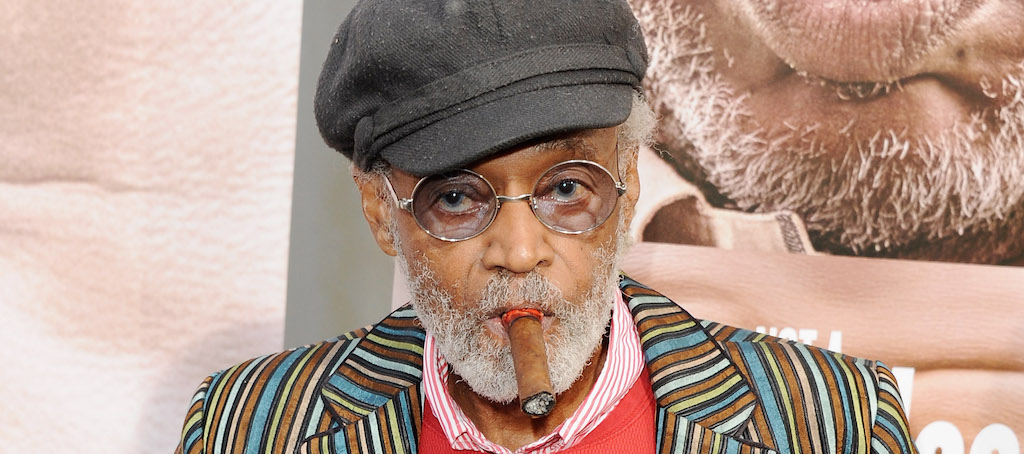Melvin Van Peebles was the second Black filmmaker ever hired to direct a movie by a major film studio. Called by some the “Godfather of Black Cinema,” he was also a pioneer of independent film, who broke free of the very studio system he’d infiltrated so he could do what he wanted. He wrote books, recorded albums, even staged a Tony-nominated Broadway musical. And on Wednesday, he passed on at the age of 89, having led a long, fruitful, and game-changing life on his own terms.
Like James Baldwin, Van Peebles was an African-American who went to Paris, hoping to find the success that eluded him at home. After writing a string of novels, he got the chance to turn one of them, La Permission, into his feature directorial debut. The Story of a Three-Day Pass, released in 1967, Hollywood flew him out. The story is they were expecting the next (white) French auteur. They were shocked when off the plane stepped a Black American.
Though the first major studio movie directed by an African-American was Gordon Parks’ The Learning Tree, in 1969, Van Peebles’ Watermelon Man, from 1970, was the second. A savage satire, it concerned a white bigot who awakens one day to find he’s Black. Columbia Pictures wanted him to cast a white actor, put him in Blackface, and have a happy ending, in which he magically switched back. Van Peebles insisted on putting Godfrey Cambridge in whiteface, if only for the opening stretch, and having him instead evolve into a passionate Black nationalist.
Van Peebles was quickly disillusioned with Hollywood. So he sank his own money into his next film: Sweet Sweetback’s Baadasssss Song, an borderline avant-garde exploitation movie about a wrongly accused Black man, played by himself, fleeing the racist police who framed him. “Rated X by an all-white jury,” read the promos, designed by Van Peebles himself, and it became a runaway hit, in turn inspiring the Blaxploitation genre.
Soon Broadway beckoned, as well as the record industry. Throughout he gave people what he wanted to give them, not what they wanted. That often meant that his work was ignored during release, only to inspire others later. By the ‘80s, he even branched out into another industry: He became an options trader on the American Stock Exchange, all while still pursuing theater and film.
His son Mario followed in his footsteps, becoming both an actor and a director, including New Jack City and Baadasssss!, in which he played his father as he made Sweet Sweetback.
“Somebody once asked me, ‘Melvin, how’d you get to the top?’”, he once said. “It was simple. Nobody would let me in at the bottom.” His passing — mere days before the release of a lavish box set by the Criterion Collection, arriving September 28 — was met with widespread mourning by the filmmakers let in the door he helped kick down.
https://twitter.com/ava/status/1440790364806258691
He made the most of every second, of EVERY single damn frame and admittedly, while the last time I spent any time with him was MANY years ago, it was a night in which he absolutely danced his face off. The man just absolutely LIVED pic.twitter.com/IIpfU8wI7q
— Barry Jenkins (@BarryJenkins) September 22, 2021
Damn. Rest In Peace Melvin Van Peebles. The blueprint and inspiration for multiple generations of filmmakers. A whole legend. https://t.co/CfHBbXqIgT
— Matthew A. Cherry (@MatthewACherry) September 22, 2021
Melvin Van Peebles has left the earthly sphere. His work and influence will remain. Condolences to @MarioVanPeebles his talented son, and all of his loved ones. RIP
— Rusty Cundieff (@RustyCundieff) September 22, 2021
And by others.
We’ve lost another lion, the true revolutionary, an artistic gangsta, cultural disrupter who forever changed the game Rest n Peace Melvin Van Peebles ✊🏾🙏🏾✊🏾 pic.twitter.com/OH9D6Slnbx
— David Alan Grier AKA #LeonMusk (@davidalangrier) September 22, 2021
Thank You KING 👑
It’s not only what you did but the times and circumstances you did them in.
Dignified Innovator.
A Filmmaker who was the essence and embodiment of indy film in “struggle times”.
The beauty is you lived to see the fruits of your labor birth and feed many🕊 pic.twitter.com/pcvPvR29CX— MC HAMMER e/acc (@MCHammer) September 22, 2021
A godfather of both black and independent cinema – Melvin Van Peebles played by his own rules and made movie history. Here are a couple shots from 2018’s TCM Fest with his son Mario introducing a crowd to the still revolutionary “Sweet Sweetback” https://t.co/0NLNwGCNTq pic.twitter.com/AMsQ7TCezW
— Larry Karaszewski (@Karaszewski) September 22, 2021
We are saddened to announce the passing of a giant of American cinema, Melvin Van Peebles, who died last night, at home with family, at the age of 89. In an unparalleled career, Van Peebles made an indelible mark on the international cultural landscape. He will be deeply missed. pic.twitter.com/HpciXXVoYo
— Criterion Collection (@Criterion) September 22, 2021
https://twitter.com/DanteRoss/status/1440800061013725185
A true legend! RIP #MelvinVanPeebles https://t.co/Bl2tsw0Nav
— rolandsmartin (@rolandsmartin) September 22, 2021
Not only a filmmaker, but a novelist, playwright, songwriter, actor, and, not mentioned in this obituary, the first black man to hold a seat on the New York Stock Exchange. What a talent, what a career, what a life! Rest In Peace, Melvin Van Peebles. https://t.co/54G1QJHovZ
— Frank Conniff (@FrankConniff) September 22, 2021
RATED X BY AN ALL WHITE JURY remains one the greatest taglines of all time, as well as perhaps the greatest act of rebellion against the MPAA we've ever seen. A true renegade. RIP Melvin Van Peebles.
— C. Robert Cargill (@Massawyrm) September 22, 2021







